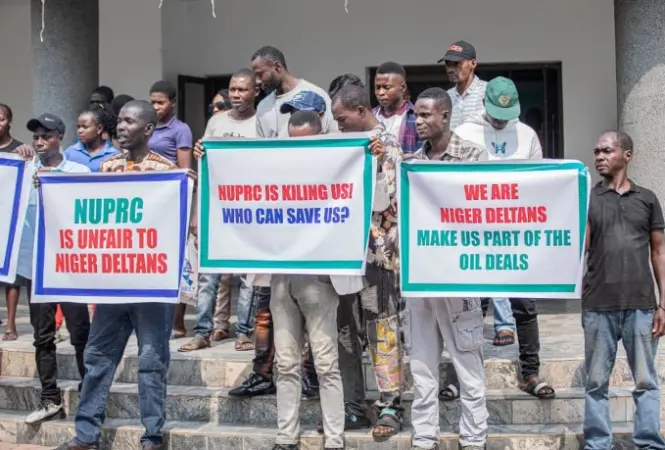Youths from oil-producing states such as Bayelsa, Rivers, and Delta are demanding a 40% share in the licenses for new oil blocks. Organized by the Niger Delta Community Youths Association (NDCYA), the group voiced its discontent over the recent allocations of oil blocks by the Nigeria Upstream Petroleum Regulatory Commission (NUPRC) to non-indigenous corporate entities.
In a bold move that has captured the nation’s attention, the youths are calling for a reevaluation of the 2022/23 mini bid round and the 2024 licensing round, citing a breach of both the Petroleum Industry Act (PIA) and the 1999 Constitution, which emphasize the importance of indigenous participation in the nation’s oil sector. They argue that these policies were being undermined in favor of foreign and non-indigenous corporate interests.
The protesters, led by notable youth leaders like Comrade Embale Jonathan, Hon. Omeizah Ogumah, and Boma Doreye, carried placards denouncing the injustice, while chanting for “justice, fairness, and equity” in the distribution of oil wealth. “We have witnessed decades of environmental degradation and economic exclusion, and now we are being denied what rightfully belongs to us,” said Jonathan, speaking to the crowd in Yenagoa, the capital of Bayelsa State.
The central grievance of the protests is the exclusion of local communities from the economic benefits of oil exploration, despite being the most affected by the environmental and health hazards associated with the industry. “It is unacceptable that our ancestral lands, ravaged and degraded by oil activities, are being handed over to outsiders while our people continue to suffer the consequences,” the group declared in a statement.
The NDCYA, through its legal representative, Blessing Agbomhere Esq., has also submitted a formal petition to the Senate President, Godswill Akpabio, demanding the immediate reversal of the controversial allocation. The petition calls for a policy shift that guarantees 40% indigenous ownership of oil blocks, citing the constitutional right of local communities to benefit from the resources extracted from their lands.
Violation of Laws
At the heart of the protests is a perceived violation of key provisions in the Petroleum Industry Act (PIA), which the youth leaders argue was intended to empower local participation in the oil sector. The PIA, passed into law in 2021, stresses the need for indigenous ownership and economic empowerment of communities affected by oil exploration. “We are the ones who have lived with the devastation caused by oil activities, and it is only right that we, as indigenous peoples, should own a significant portion of the industry that has been built on our suffering,” stated Hon. Omeizah Ogumah.
Additionally, the youths have demanded that the federal government urgently address the environmental damages caused by decades of oil exploration. “The waters are polluted, the lands are destroyed, and our people are dying from the effects of oil spills and gas flaring,” said Comrade Sunny Ifijen, another prominent leader of the movement. “The companies profiting from our resources must be held accountable, and our land must be cleaned up.”
The petition also calls for corporate social responsibility (CSR) measures to be strictly enforced. These include creating employment opportunities for local youth, offering vocational training programs, and supporting small businesses within the Niger Delta.
The protests, which are also being supported by local civil society organizations and affected communities, highlight the deep frustration felt by Niger Delta youths who have seen little benefit from the billions of dollars generated by oil extraction in their region. Despite being the heart of Nigeria’s oil industry, the Niger Delta has remained one of the country’s poorest and most underdeveloped regions, with the adverse effects of oil exploitation visible in the form of oil spills, gas flaring, and widespread environmental degradation.
The Bigger Picture
The Niger Delta, long considered the economic backbone of Nigeria due to its oil reserves, has been embroiled in conflicts and protests over the years. The oil industry, once hailed as a major economic asset, has also been a source of social and environmental problems. Communities in the Niger Delta have repeatedly called for better environmental management, compensation for damages, and more significant stakes in the oil wealth generated from their lands.
The call for a 40% allocation of oil blocks is not the first time Niger Delta leaders have sought greater involvement in the oil industry. Previous demands have centered on issues such as resource control and better royalty distributions, but this latest round of protests has brought renewed focus on the urgent need for reforms.
The federal government and NUPRC have yet to make an official statement on the issue, but the mounting pressure from local communities suggests that action may soon be required. The next steps in this unfolding crisis will likely involve negotiations between the Niger Delta youths, lawmakers, and the oil companies operating in the region.

